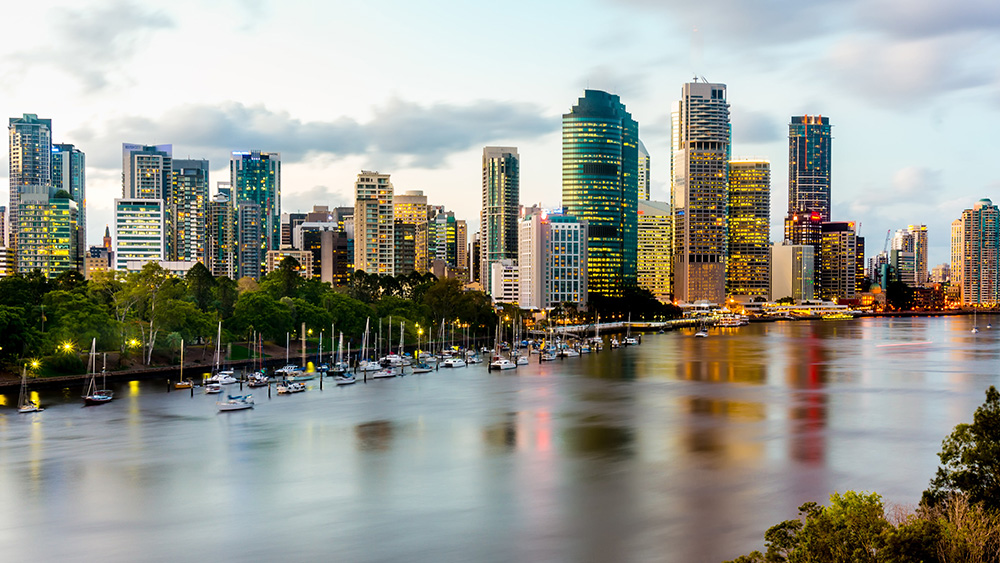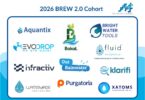Blockchain technology has huge potential to increase transparency and accountability in the way that water is traded and allocated, ensuring that rights are upheld and water is sent to where it is most needed.
We spoke with Katrina Donaghy and Fraser McLeod from Civic Ledger to find out more.

Tell us more about your company?
Civic Ledger is a multi-award winning Australian company with expertise in blockchain technology and natural capital exchange development. Our goal is to empower land managers and water users to lead transformation through decentralization and peer-to-peer exchange.
Civic Ledger’s advanced blockchain-enabled water solution – Water Ledger – is built on the Ethereum blockchain and utilises Civic Ledger’s ERC1753 smart contract Interface for Licences standard, to handle the issuance of water licences and permits.
During 2020, Civic Ledger collaborated with CRCNA on a blockchain technology pilot to tokenise water markets in Mareeba-Dimbulah Water Supply Scheme on the Atherton Tablelands.
The Water Ledger trading solution was adapted to the MDWSS business and operating rules to observe how blockchain technology can reduce trading costs, improve the efficiency of trade processes, and increase water market transparency.
Why is water scarcity such a global concern?
Water scarcity is a global concern for the simple fact that all life depends on the availability of an adequate supply of water, in both quantity and quality.
In the face of climate change, increasing demand for irrigation, and competition between agricultural, industrial, environmental, energy and mining related water uses and users, the imminent reality of water scarcity of necessity impacts how we manage water resources.
Models for “business as usual” economic growth and development are often dependent on there being ongoing water availability, in the same locations, at the same opportunity cost.
Yet water is a finite resource, and, according to the UN World Water Development Report 2021, global freshwater use has increased by a factor of six over the past 100 years and continues to grow at a rate of roughly 1% annually. This increase in demand can be attributed to a combination of population growth, economic development and shifting consumption patterns.
For people to invest in high value crops and industries that require ongoing water, they need to be able to rely on water being available into the long term. As such, water scarcity, and hence water security, has potential to influence food security and economic prosperity for decades to come.
What impact do you think climate change has on water security?
The World Economic Forum estimated in 2017 that demand for water globally would outstrip supply by 40% by 2030. In addition, the Food and Agriculture Organization (FAO) estimates that the world will need about 60% more food by 2050, and that irrigated food production will increase by more than 50% over the same period.
The mismatch between supply and demand of water is being intensified by the changing patterns of water availability. Water events are far less predictable, and conversely more intense both in oversupply and omission, with damaging floods, devastating droughts, far more common.
Climate change is already affecting the distribution of water. This makes the task of water management increasingly critical, which is exactly why we must urgently modernize our approaches to how we share, exchange, and trade water.
The problem of water is either too much, too little, or too dirty – making the historical approach to invest in infrastructure and regulation to even out the peaks and troughs inadequate and outdated as a response.
There is an urgent need to make water markets liquid, rather than siloed, opaque and fractured. It is time to invest in future-proofing approaches that build adaptive capacity, flexibility, and resilience, like Water Ledger.
Water Ledger has the power to unlock sluggish water markets so that market efficiency can take effect, and water can be allocated through market demand to its most valuable and beneficial uses. This gives water users more choices about how they can get the most out of their water.
If you could change one thing about the way we use water currently, what would it be?
We envisage a world where natural resources, like water, are allocated according to their highest value uses. Not all these uses will be economic. Some will be spiritual, cultural, and some environmental.
If we could change one thing about how we use water currently, it would be the adoption of a shared and trustworthy point of truth like Water Ledger that provides indisputable accountability between the water we have, the water we use, and the water we share.
Without that, how can we imagine managing water resources sustainably?
How does your organization help mitigate the problem?
Water Ledger provides the basis for automated, open issuance and trading of digitized water rights, whether that be through auction, sale, lease, options, or sharing.
Transparent and immutable water markets will go a long way to address the problems of under-utilisation of water that is available, underpricing of water that is scarce, and market information asymmetry leading to inequality and inefficiency in water markets.
Smart contract codified business rules, of which there can be thousands, are made “compliant by design” and can be applied consistently to all users in the same way at the same time.
Peer-to-peer trading, and real time market information like price and volume open data, puts the balance of choice back into the hands of water users themselves, so that markets can respond in real time to their needs.
What is your vision for the future of water?
There needs to be a fundamental shift in how natural resources are valued, extracted, managed and distributed in order to achieve real and lasting sustainability.
We are building the technological basis for a world where all actors are empowered to share the world’s natural resources equitably, responsibly, and transparently. We want to transform how water is valued and shared.
In the world of water today there is a high degree of fragmentation across regulation, policy, science, and information – it is not accidental, it is by design. In this environment there is scope for double dipping, double spending, a lack of accountability, and much more.
With blockchain we can do so much more than just incentivize enterprise and organizations to do good. We aim to build the systems by which communities and collectives can collaborate to take charge of their own resources, account for them, plan, and assign them to the purposes that matter most.







